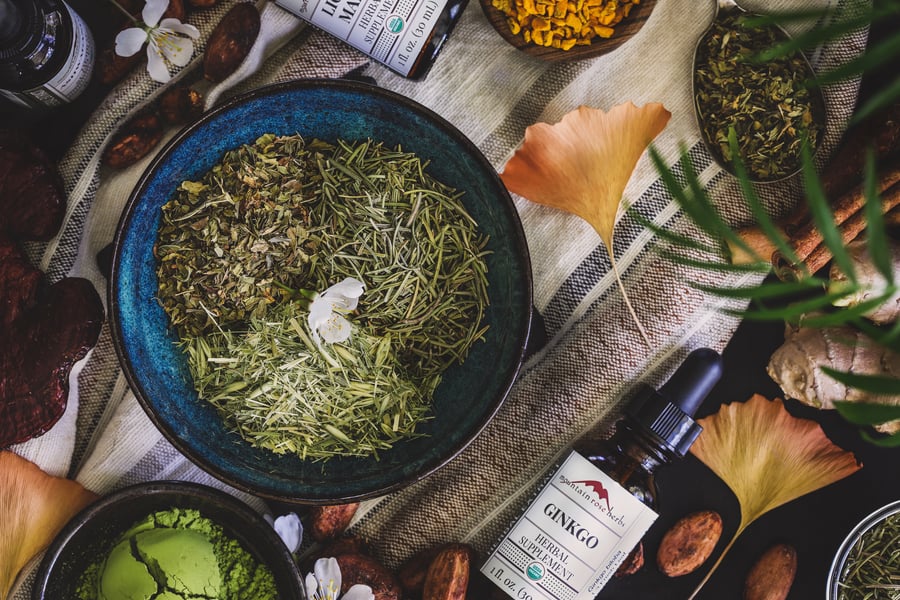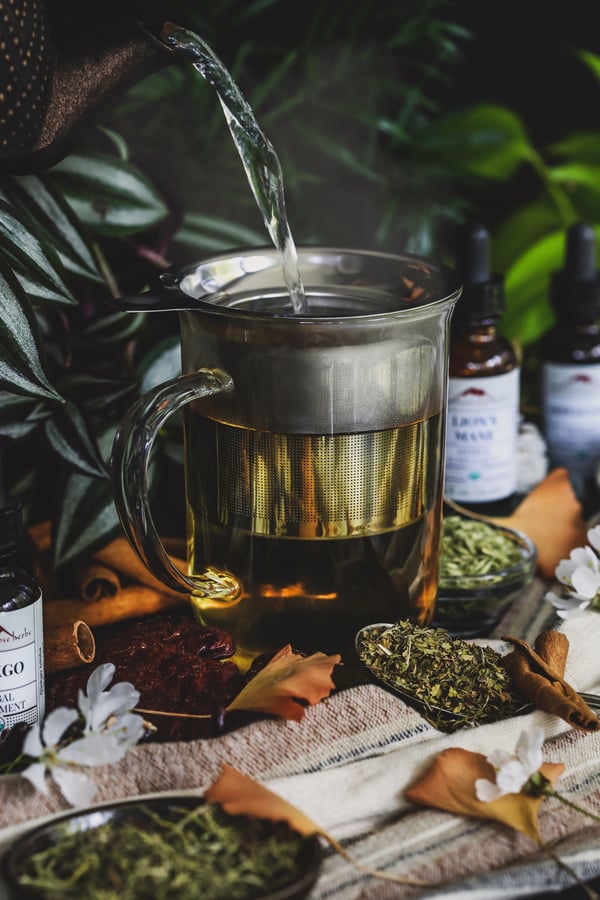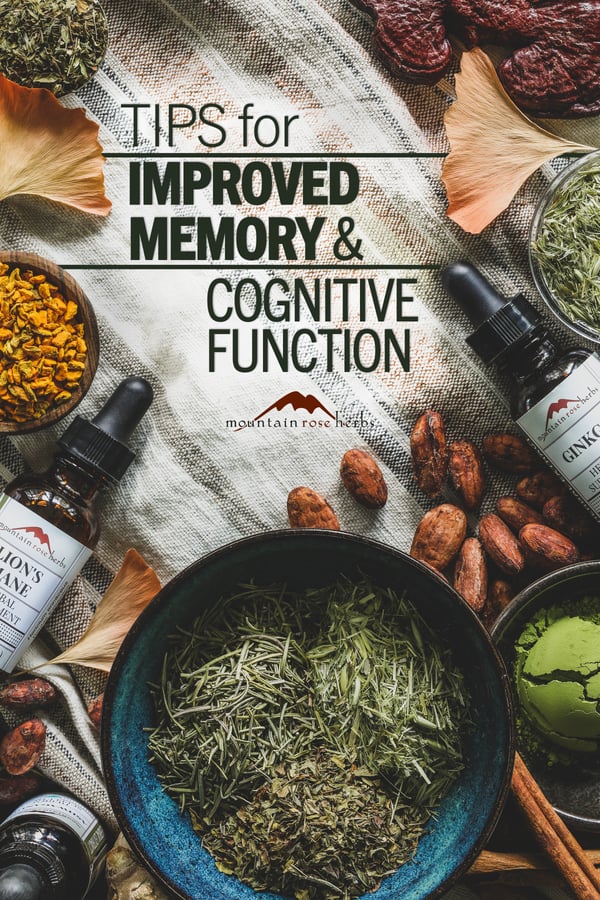
Foggy brain and fuzzy focus affect many of us from time to time and during certain phases of our lives. While many herbs do indeed have a long history of use and modern research to support mental clarity, first it’s important to take a deep look at what’s going on in your life that’s draining your brain power to truly enhance your mental prowess and vitality.
What’s Draining Your Brain?
Common cognitive pitfalls include:
Slacking on Quality Sleep: During sleep, the body hits the “rest and repair” button, doing double time to clear metabolic waste through our detoxification systems, restoring the nervous system, and repairing damage. If we’re not sleeping enough or sleeping poorly, we may notice immediate and long-term cognitive consequences. Alongside maintaining good sleep hygiene—including avoiding stimulants, dimming lights at night, unplugging a few hours before bed, and having a routine that includes winding down—many of the other healthy habits below may improve sleep quality. Most of us feel most optimal with 7 to 9 hours of sleep per night, more for youngsters and teens. Sleep apnea can also aggravate sleep quality, cognition, stress levels, hot flashes, and many other patterns of imbalance and should be addressed by your doctor.
Dehydration: Hydration is essential to healthy body function and detoxification, so aim for approximately half your body weight in fluid coming from water, water infused with fresh herbs or slices of fruit, seltzer, herbal tea, broth, soup, water-rich produce, etc.
Blood Sugar Roller Coasters: Many people don’t realize the impact that glucose spikes and crashes have on them, dampening mood, aggravating fatigue, waking us in the middle of the night, and triggering brain fog. While the overall quality of the diet is important for nutrition—rich in whole foods and lots of vibrant plants plus adequate protein and healthy fats—how you eat also profoundly impacts blood sugar balance. Pairing protein with high-fiber complex carbs and boosting your produce intake helps level out the blood sugar roller coaster, which can help with whole-day energy, clear thinking, as well as nighttime sleep quality, not to mention long-term vitality as we age.
Missing Nutrients: Many nutrients help our body function and brain think. Poor consumption or digestion and assimilation of key cognitive nutrients including iron (particularly if you have heavy menstrual bleeding or methylation challenges), B12, and omega 3 fatty acids, as well as other vitamins and minerals make it harder for the brain to do its job. Many medications also deplete nutrients. Integrating nutrient-dense food, herbs, and/or supplements may help. If you’re interested in testing to see where you’re at, your doctor may be willing to run a few basic labs, but a functional medicine practitioner or naturopathic doctor will often go deeper to sleuth out the patterns in your body.
Inactivity and Lack of Connection to Nature: In the business of our day-to-day we forget that our bodies and brains were designed to move regularly and be in natural settings. Even just 10 minutes a day moving outdoors through the forest, garden, a park, or garden-lined street puts the brain in a calm yet energized and more receptive state.
Stress: Those of us living in the modern world already had an issue with chronic stress, and the past few years of pandemic and political turmoil has not helped. Where possible, consider what is not serving you that you can let go of, and what activities nourish your body and soul to gradually integrate in. Some examples include walking in nature, gardening, long hugs, reading a joyful book, a quick deep breathing exercise, meditation, art, or yoga.
Peri/Post-Menopause and Andropause: Hormonal shifts as we age can interrupt sleep, aggravate inflammation, and make us more susceptible to stress hormone surges. Give yourself extra TLC during these transition times – on all the things we’re talking about already in this article. Glucose roller coasters, stress, and sleep apnea are just a few surprising triggers of hot flashes. Consider seeking support from a holistic practitioner if needed. Other hormonal fluctuations including in thyroid function – also common during the perimenopausal years or during/after pregnancy – can also aggravate fatigue and brain fog.
Inflammation: Stress, disease, lack of sleep, blood sugar instability, inactivity, and an unhealthy diet are just a few of the inflammatory triggers in our bodies, and when the body is inflamed, it’s more difficult for the brain to function properly. Alongside those important healthy habits, integrating antioxidant-rich berries, leafy greens, colorful produce, green (or white or black) tea, spices, and aromatic culinary herbs into your regular diet may help tip the scales in your favor.
Poor Circulation: Healthy blood flow brings nutrients into and waste out of the brain and throughout the body. Regular activity is the best way to support circulation, but the antioxidant-rich, nutrient-dense foods and herbs mentioned above also help. Traditional “blood movers” including pungent, warming herbs and spices including garlic, onions, ginger, hot peppers, etc. Just be mindful of herb-drug interactions if you’re taking them in therapeutic doses. Deep red, blue, black, and purple pigmented foods and herbs also tend to have cardiotonic benefits.
In addition to the important healthy habits listed above, these herbs have particular affinity through the ages and often modern research to support their benefits for the brain.
- Perky & Alert Aromatics: Rosemary, Peppermint, Spearmint, Holy Basil
- Calm & Alert Brain Tonics: Lemon Balm, Holy Basil, Bacopa (Brahmi), Gotu Kola, Spearmint
- Brain-Loving Adaptogens & Gentle Stimulants: Rhodiola, Schisandra, Ashwagandha, Reishi, Cordyceps, perhaps with a little Cacao or Green Tea
- Circulation Support: Ginkgo, Rosemary, Berries, Turmeric, Hawthorn, Ginger, Garlic, Cinnamon, Green, Black, or White Tea
- Deep Restoratives: Lion’s Mane, Gotu Kola, Bacopa (Brahmi), Lemon Balm
- Nutritives: Nettle, Oat Straw, Violet Leaves
Herbal brain tonics can be enjoyed in food, as tea, in tinctures, pills, powdered and mixed into honey nut butter balls… the possibilities are endless! Aromatic herbs can also be spritzed or diffused in the air and inhaled. Always dig deeper into each herb or seek professional guidance to determine what’s right for you and double-check for herb-drug interactions before starting a new herbal routine.
Simple Minty Memory Tea Recipe
Ingredients
- 1 tsp. peppermint
- 1 tsp. spearmint
- 1 tsp. rosemary
- Optional additions: lemon balm, holy basil, gotu kola, nettle, oat straw
Directions
- Steep the herbs in 12-16 ounces of near-boiling water for 15 minutes or longer.
- Enjoy after meals and at your desk, inhaling deeply as you sip. Enjoy!
Looking to learn more herbalism wisdom from Maria Noël Groves?
Add a Copy of Body Into Balance To Your Home Library or
Read More at Wintergreenbotanicals.com
You may also enjoy:
- 10 Essential Oils for Memory & Focus
- Memory Zest Tea with Nootropic Herbs
- 7 Ayurvedic Herbs for Vitality














